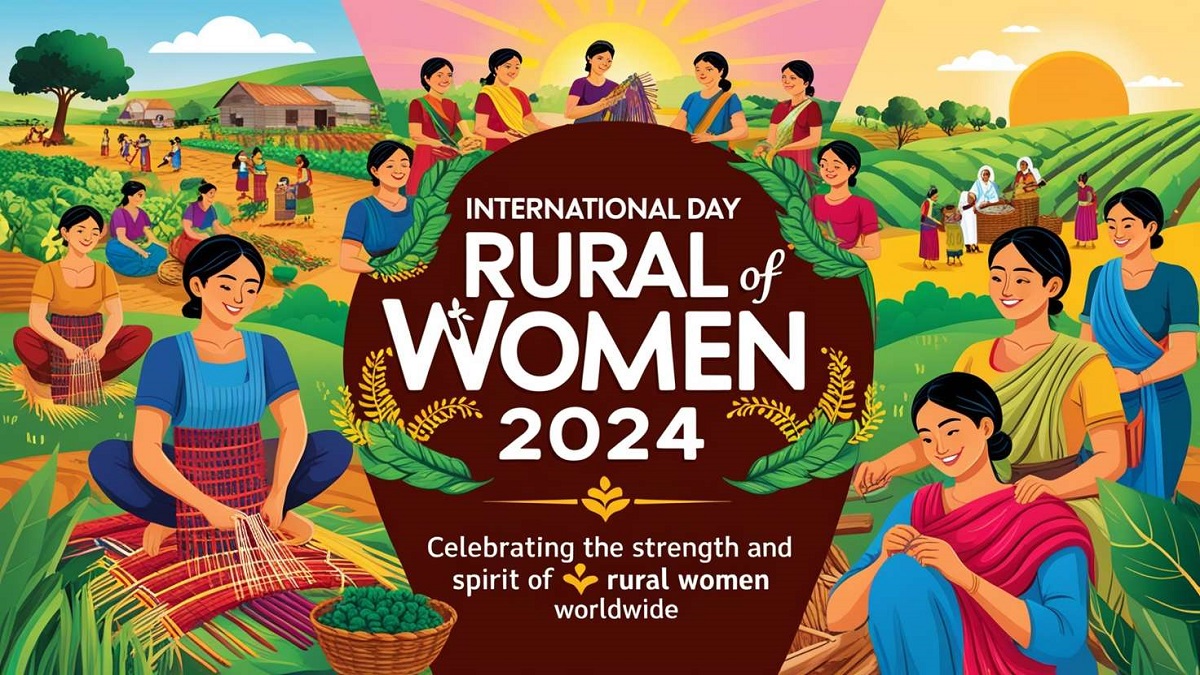The International Day of Rural Women is celebrated annually on October 15, recognizing the critical role rural women play in the advancement of agriculture, rural development, and poverty eradication. In 2024, the theme for this significant day is “Rural Women Sustaining Nature for Our Collective Future: Building climate resilience, conserving biodiversity, and caring for land towards gender equality and empowerment of women and girls.” This theme underlines the importance of rural women as key actors in promoting environmental sustainability and climate resilience while also emphasizing the need for gender equality.
Rural Women: Key Contributors to Sustainable Development
Rural women make up approximately 22% of the global population, yet their contributions go far beyond their numbers. They are the backbone of their communities, playing a pivotal role in food production, conservation of natural resources, and the promotion of community health. Despite facing numerous challenges, rural women are at the forefront of efforts to improve food security, enhance biodiversity, and address climate change.
The Role of Rural Women in Food Production and Security
Agrifood systems heavily rely on the labor of rural women. Globally, 36% of working women were employed in agrifood systems as of 2019. These women are central to ensuring food security and providing nutrition for both rural and urban populations. Their efforts in small-scale farming, livestock management, and fisheries contribute significantly to household food security, yet their work often goes underrecognized.
Challenges Faced by Rural Women
Despite their indispensable contributions, rural women face systematic challenges, including higher rates of poverty, limited access to education, healthcare, and social services, and discriminatory practices stemming from traditional gender roles. These issues are even more pronounced among rural Indigenous women and girls, who often experience multiple layers of marginalization.
Poverty and Economic Inequality
Rural areas worldwide see higher rates of both extreme and multidimensional poverty. Rural women are often trapped in low-paying or unpaid work and have limited access to financial services, land ownership, and legal rights, which perpetuates economic inequality. Additionally, they are often excluded from formal employment opportunities due to social norms and unequal access to education and skill development programs.
Gender Inequality in Access to Resources
In many countries, discriminatory social institutions, including both formal and informal laws, prevent women from owning land or accessing the credit needed to invest in agriculture. This systemic inequality hinders their ability to fully participate in decision-making processes that affect their communities and livelihoods. Social norms and traditional practices also continue to limit women’s roles outside of their households, restricting their social and economic mobility.
Rural Women as Custodians of Natural Resources and Biodiversity
Rural women play a vital role in conserving biodiversity and managing natural resources. They act as custodians of indigenous knowledge and sustainable farming practices, ensuring the preservation of plant species and ecosystems. Their close connection with nature makes them critical actors in climate change adaptation and mitigation efforts.
Building Climate Resilience
Rural women are instrumental in building climate resilience in their communities. They implement sustainable agricultural practices, manage water resources, and engage in land stewardship efforts to combat environmental degradation. Through their day-to-day work, they help their communities adapt to the impacts of climate change, such as erratic weather patterns and reduced agricultural yields.
Health and Well-being: Rural Women at the Heart of Community Care
In addition to their role in agriculture, rural women are central actors in their communities’ healthcare systems. Globally, women make up 67% of the healthcare workforce, and an estimated 70% of community healthcare workers. In rural areas, community healthcare workers—often unpaid or underpaid women—are frequently the only healthcare providers available to their communities.
Unpaid Care Work
Rural women also shoulder the burden of unpaid care work, taking responsibility for the care of children, the elderly, and the sick. This care work is essential for the overall health and well-being of their families and communities but is often invisible and undervalued in economic terms.
Other Essential Roles
In addition to their agricultural and caregiving roles, rural women are heavily involved in areas such as water and sanitation services, occupational health, and zoonosis control. These roles are critical in maintaining the health infrastructure of rural communities, yet women often face overwork and limited resources to carry out these tasks.
Recognizing the Contributions of Rural Women
The International Day of Rural Women was first established by the UN General Assembly in 2007 through Resolution 62/136 to recognize “the critical role and contribution of rural women, including Indigenous women, in enhancing agricultural and rural development, improving food security and eradicating rural poverty.” This day serves as a reminder of the immense contributions rural women make to global food security, biodiversity conservation, and community well-being, despite the numerous challenges they face.
This Year’s Theme: Empowering Rural Women for a Sustainable Future
The 2024 theme, “Rural Women Sustaining Nature for Our Collective Future,” highlights rural women’s essential roles in:
- Building climate resilience through sustainable land and resource management.
- Conserving biodiversity and protecting ecosystems.
- Working towards gender equality and the empowerment of women and girls.
By focusing on the intersection of environmental sustainability and gender equality, this year’s theme stresses the importance of empowering rural women to lead efforts in climate adaptation, biodiversity preservation, and community health.
Moving Forward: Supporting Rural Women
To truly support rural women in their roles, policies and programs must address the systemic barriers they face, such as:
- Equal access to land ownership, financial services, and education.
- Legal reforms to eliminate discriminatory practices.
- Investment in healthcare, infrastructure, and social services that directly impact rural communities.
Additionally, increasing recognition of unpaid care work and ensuring fair wages for community healthcare workers are essential steps toward empowering rural women and enhancing their well-being.




 Central Excise Day 2026: Why 24 February...
Central Excise Day 2026: Why 24 February...
 World Peace and Understanding Day 2026: ...
World Peace and Understanding Day 2026: ...
 International Mother Language Day 2026: ...
International Mother Language Day 2026: ...








